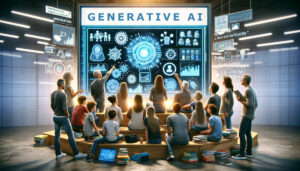AI and tech news keeps getting more significant and impactful. As we wait for big news from Google I/O and OpenAI, this week we learned of AlphaFold 3’s groundbreaking drug discovery biotechnology, potentially revolutionizing healthcare and agriculture. Additionally, we learned that AI has discovered where Plato was buried, OpenAI is considering letting users generate AI NSFW, and Mark Zuckerberg is considering buying the Associated Press. Those small stories aside, we learned of even more significant changes, so let’s get to it.
This week’s Tech and AI news was preoccupied with news for next week. Google’s largest developer event, I/O 2024, is scheduled for Tuesday, May 14th, and it was announced this week that OpenAI will release their new search engine on Monday, May 13th (as I previously reported) and explains why so many Googlers have been recruited by OpenAI. In related news, the mysterious gpt-2-chatbot model reappeared this week on the LMSYS Chatbot Arena, outperforming GPT-4 in many head-to-head battles, leading experts to speculate if this was GPT-4.5 or possibly the new LLM powering OpenAI’s search engine. OpenAI’s CEO did not deny it when asked. My top story of the week has to be Google DeepMind’s release of AlphaFold 3, which can model complex biological interactions, including proteins and RNA. This technology accelerates drug discovery, facilitating the development of targeted therapies that could treat a broad spectrum of diseases more effectively. Additionally, AlphaFold 3’s capabilities extend beyond healthcare, potentially benefiting sectors like agriculture and environmental science by improving crop resilience and bioremediation efforts.
To kick off this week’s news roundup, we’ll start with Elon Musk’s comments saying “Meta can’t be trusted,” following their hefty fine in Turkey, but also due to a legal battle involving OpenAI and claims they destroyed evidence of a trove of books used to train their models (employees are gone too).
Regarding public interest and safety, Tesla’s Autopilot system is under renewed examination by the NHTSA after a significant vehicle recall, raising questions about the safety of automated systems in consumer vehicles. On a more distressing note, a report emerged of a woman trapped in her Tesla in 115-degree heat during a software update, underscoring the sometimes overlooked dangers of our growing reliance on connected technology.
From the lab to real-world applications, Google and Harvard have unveiled the largest-ever 3D map of the human brain, which promises to push the boundaries of neuroscience. Such advancements are paralleled in the industrial sector, where innovations like AI-enhance 3D printing technologies showcase AI’s broad applicability across different manufacturing processes.
Legal frameworks are also adapting, with generative AI poised to transform how mergers and acquisitions are negotiated and executed, signaling a shift in how legal professionals will operate. Moreover, the world’s first defamation lawsuit against ChatGPT in Australia marks a pivotal moment in the legal challenges associated with AI communications.
The evolution of AI in computer science education is becoming more evident as traditional programming classes shift focus from basic syntax to higher-level concepts and problem-solving skills. This change is driven by the growing use of AI tools like ChatGPT that can handle programming, allowing educators to prioritize critical thinking and complex problem-solving in their curricula (the premise of my book Generative Software Engineering). Meanwhile, OpenAI’s partnership with Stack Overflow aims to integrate AI deeper into coding practices. This integration is timely as Google plans to end free access to its Gemini API, signaling a significant shift in the accessibility of AI tools for developers.
The integration of AI in security measures is also notable. Visa employs generative AI to combat brute force attacks, demonstrating how AI can enhance cybersecurity efforts in real-time financial transactions.
This week, we learned about the growing anxiety among college-bound students about AI’s influence on future educational and professional opportunities. If teachers and students are using AI, what exactly are we doing, and how is student performance assessed? As business leaders say, ChatGPT experience is better than a college degree. Will this lead to educational disillusionment?
In government and public policy news, the U.S. is making strides with proposed legislation to enhance control over AI technology exports, aiming to protect national security from foreign exploitation of advanced AI capabilities. California’s initiative to utilize AI in resolving traffic issues illustrates how local governments embrace AI to address everyday challenges and improve public services. Meanwhile, concerns about AI in cybersecurity are validated this week by FBI warnings about cybercriminals’ increased use of AI just as Microsoft creates AI tools for spies, and the Pentagon launches new technology to stop AI-powered killing machines from going rogue.
In the business news, the focus is increasingly on enhancing AI investments, as evidenced by Accenture’s survey showing that 87% of executives will push towards integrating generative AI in supply chain and production, alongside Sprinklr’s deployment of digital twins to refine customer experience management as well as Fairgen’s new synthetic Survey enhancer.
AI continues to reshape entertainment industries, from AI-driven film production dilemmas to studios not talking about it. Game studios are hungering to accelerate the use of AI.
This week in healthcare, we learned of the FDA’s clearance of an AI-based medical device capable of detecting three types of skin cancer, exemplifying the potential to improve diagnostic accuracy. In addition, this week, we learned that AI’s capability to triage patients in emergency scenarios as well as human doctors, underscores its integral role in enhancing critical healthcare responses, further supported by new AI methods in detecting and managing life-threatening conditions like sepsis.
That is it. Stay tuned for more news next week. I APPRECIATE ALL THE READERS. Help spread the word. I put these newsletters together so productive humans like you can stay on top of the latest AI stories shaping our world.
If you like these weekly tech news reports, subscribe to get notified of new editions and updates. For daily updates, you can check out our news page. Or, for a more in-depth analysis of the week’s news, sign up to receive our free weekly newsletter located to the right of the daily news.



